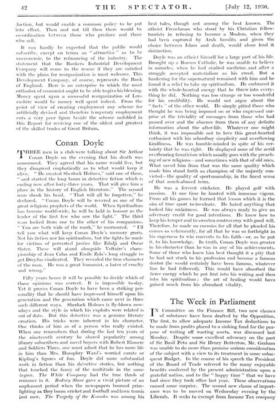Conan Doyle
'THREE men in a club were talking about Sir Arthur
Conan Doyle on the evening that his death was announced. They agreed that his name would live, but they disagreed emphatically as to what would keep it alive. " He created Sherlock Holmes," said one of them, " and started the long boom in detective fiction which is ending now after forty-three years. That will give him a place in the history of English literature." The second man shook his head. "That will all be forgotten," he declared. " Conan Doyle will be revered as one of the great religious prophets of the world. When Spiritualism has become world-wide, he will be held in honour as the leader of the first few who saw the light." The third man looked from one to the other of his companions. " You arc both wide of the mark," he murmured. "I'll tell you what will keep Conan Doyle's memory green. Not his fiction nor his spiritualism, but the fights he made fir victims of perverted justice like Edalji and Oscar Slater. These will stand alongside Voltaire's cham- pionship of Jean Calas and Emile Zola's long struggle to get Dreyfus vindicated. They revealed the true character of the man. He was a great humanist, a hater of cruelty and wrong."
Fifty years hence it will be possible to decide which of those opinions was correct. " It is impossible to-day. Yet it proves Conan Doyle to have been a striking per- sonality that he should have impressed himself upon his generation and the generation which came next in three such different ways. Sherlock Holmes is fly-blown now- adays and the style in which his exploits were related is out of date. But this detective was a genuine literary creation. His tricks were inherent in his character. One thinks of him as of a person who really existed. When one remembers that during the last ten years of the nineteenth century he shared popularity among library subscribers and novel buyers with Robert Elsmere and Soldiers Three, One must admit that he has more life in him than Mrs. Humphry Ward's worried curate or Kipling's figures of fun. Doyle did more substantial work in fiction than his ds.tective stories, but nothing that touched the fancy of the multitude in the same degree. The White Company had the true throb of romance in it. Rodney Stone gave a vivid picture of an unpleasant period when the newspapers boomed prize- fighting as they boom cricket and football and lawn tennis just now. The Tragedy of the Korodco was among his
best tales, though not among the best known. The atheist Frenchman who stood by his Christian fellow- tourists in refusing to become a Moslem, when they had been captured by Arab bandits and given the choice between Islam and death, would alone lend it distinction.
Doyle was an atheist himself for a large part of his life. Brought up a Roman Catholic, he was unable to believe in miracles, when he had studied medicine, and after a struggle accepted materialism as his creed. But a hankering for the supernatural remained with him and he found it a relief to take up spiritualism. He embraced it with the whole-hearted energy that he threw into every- thing he did. Nothing was too strange or too wonderful for his credibility. He would not argue about the " facts " of the other world. He simply pitied those who thought he was being imposed on or who expressed sur- prise at the triviality of messages from those who had passed over and the absence from them of any definite information about the after-life. Whatever one might think, it was impossible not to love this great-hearted enthusiast with his schoolboy simplicity and overflowing kindliness. He was humble-minded in spite of his cer- tainty that he was right. He displayed none of the acrid overbearing fanaticism which usually goes with the preach- ing of new religions—and sometimes with that of old ones. What saved him from that was the same quality which made him stand forth as. champion of the unjustly con- victed—the quality of sportsmanship, in the finest sense of that mach-abused term.
He was a fervent cricketer. He played golf with passion. At one time he hunted with immense vigour. From all his games lie learned that lesson which it is the aim of true sport to inculcate, lie hated anything that looked like unfairness. He was always ready to give an adversary credit for good intentions. He knew how to keep his temper and to sweeten controversy with good will. Therefore, he made no enemies for all that he pleaded his causes so vehemently, for all that he was so forthright in Iris eagerness to win converts to his faith—or, as he put it, to his knowledge. In truth, Conan Doyle was greater in his character than he was in any of his achievements. Some of those who knew him best thought it a pity that he had not stuck to his profession and become a famous doctor (he would certainly have been famous, whatever line he had followed). This would have absorbed the fierce energy which he put first into his writing and then into his spiritualism.: the art of healing would have gained much from his abundant vitality.




































 Previous page
Previous page